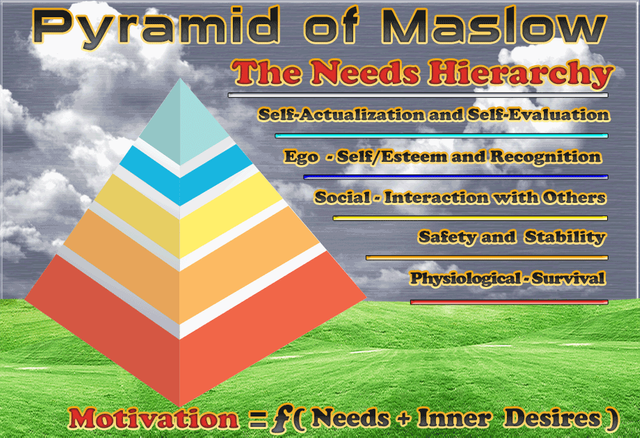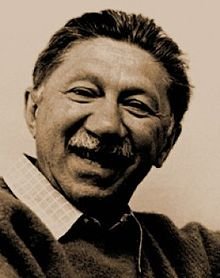Part 2 - The Short History of Existentialism: V - Humanistic Existentialists - Abraham Maslow
The Dialectics of Liberation: Anarchism, Existentialism, and Decentralism.
Part 2 - The Short History of Existentialism:
V - Humanistic Existentialists - Abraham Maslow
"We are all humanists if we believe in Human rights law and humanitarian ideals." - charlie777pt
1 - Introduction
"What is necessary to change a person is to change his awareness of himself."- Abraham Maslow
Humanists, from atheists to agnostics, include some authors with profound religious beliefs, but they all wished to join all the religious dogmas to co-operate in the construction of a new world, under the principle of self-realization and liberation, that would be the perfect solution to solve human conflicts without violence, blood, and wars, devastating humanity like an incurable disease.
Humanism does not believe in faith, and wants to break with mystical and mythical vies of reality and people because we have to live a self-fulfilling of our unique and only life, and take away the influence of transcendent forces, superstitions and the belief of living after death.
"Rational beliefs bring us closer to getting good results in the real world." - Albert Ellis
Educational psychology is today a mirror of the thoughts of humanist philosophy, with application on the balanced equilibrium of cognitive and emotions of the child's socialization in the learning processes, oriented by the their well-being, to make us aware that children and students have to express their psychological needs to build a self-image and self-esteem the basis of a strong self-concept leading to self-fulfillment.
Alfred Adler (1870-1937) as a psychotherapist, become knowledgeable with the concept of the inferiority complex, influenced a lot of humanist psychologists like Abraham Maslow, Carl Rogers with non-directive therapies, Erich Fromm with the fear of freedom (that will have his own post), and Albert Ellis with his therapy of rational emotive behavior.
"The only normal people are the ones you don't know very well." - Alfred Adler
Abraham Maslow, as the founder of an individual psychologt, become well-known with his pyramid of the priority of human needs, from the physiological heading to the last state of self-actualization to achieve our full potential, talking in the perspective of the sanity face of human beings instead of Freud's view of psychological illness.

These needs go from the primary (or elementary - physiological and safety) to a more abstract (or secondary- socialize, self-esteem, and self-actualization).
|
One of the more cited theories in social psychology and motivation, is the pyramid of the needs of each individual, which was formulated by Abraham Maslow and are correlated with motivation, though their hierarchization is questionable.
Maslow presented a theory of motivation, according to which human needs are organized and arranged in levels, in a hierarchy of importance and influence, in a pyramid, on the basis of the lower needs (physiological needs) and, at the top, needs (the need for self-realization).
When the need is not met the individual remains eternally frustrated, he tends to make a transfer or compensation by showing the motivational cycle in human life.
As such, it is perceived that motivation is a cyclical and constant state in personal life, which means that an individual who fulfills a need is immediately replaced by another, leading each individual to an unceasing struggle to satisfy them at an ever-increasing level high.
What inner needs and desires to motivate and move people to action?
| Motiv | Pyramid of Maslow | Needs |
 - Related to Self (self) - Related to Self (self)-Essence? Mind |
 5 - Self-Realization Needs 5 - Self-Realization Needs |
From each person realizing their own potential:
|
 4- Ego Needs (Self-Esteem / Recognition) 4- Ego Needs (Self-Esteem / Recognition) |
|
|
|
 3 - Social needs 3 - Social needs |
They are related to the needs:
|
 -
Of Phisical Order -
Of Phisical Order- Survival Bios |
 2 - Security needs 2 - Security needs |
Constitute:
|
 1- Physiological needs 1- Physiological needs |
Are connected to :
|
Our needs in this hierarchy of linear ascension and not dialectic, are connected to stages of development that corelated to a scale of values that each one have to transpose, and that there are also differences between each culture and each individual.
3 - Maslow and the Self-actualized People
"The good life is a process, not a state of being. It is a direction, not a destination."- Carl Rogers
Maslow focused on studying what he calls "self-actualizers" like psychologically healthy subjects, that had the self-actualization characteristics and qualities that lead to optimal self-health and malleability, enjoying more fully psychological "peak experiences" of freedom, openness and the sense of belonging in their everyday's life.
This kind of People with very identical personalities seem to be more connected to reality, more focused on problems to find solutions, they don't feel lonely when they are alone, because it seems that they can separate the problems from themselves, they don't bend to social conventions by their independence, reveal more creativity, and establish strong relationships with others.
Maslow also noticed that Self-actualizing People, will always show some impulsivity and they seem to be more detached for the forces of the environment and the influence of cultural constraints, as well as, they follow their own inner strength, using their capabilities based in a big self-confidence and acceptance, and they are motivated to achieve their full potential.
Maslow defined Self-actualization as the capacity to transcend the biological, psychological and social needs, to fulfill the spiritual abstract needs as the meaning of life.
He pointed a lot of qualities or traces of the self-actualizing people:
- Truth in the perception of reality
- Beauty of "making the right thing"
- Wholeness of a synergetic interconnection with others
- Goodness of being honest and benevolent
- Aliveness from their spontaneity and self-reliance
- Uniqueness of the ones that are very different from "normality"
- Justice as the fair social "equalizers" that don't put their interests first;
- Reliance for self-sufficiency and will-determination in total autonomy;
- Happiness and Completion radiating joy and will for funny playing and fulfillment
- Easiness and Simplicity spreading the sense that all problems can be solved in simple direct ways
"Our modern states are preparing for war without even knowing the future enemy." - Alfred Adler
So, do worry to be happy using a moral framework for living in this physical world, instead of thinking in the next spiritual life that surely wouldn't have the same rules.
Don't get stuck in the mud immobilism of waiting for a better life brought by the mighty powers of God, after death and turn your Fate into your self-built Destiny.
If you are a "good" conformist you have a place on Heaven.
We have finished the posts on the subject of humanistic existentialism, and the next posts will be about the difficult task of talking about post-structuralism with difficult modern authors like Michel Foucault, Emmanuel Levinas, Paul Ricoeur, Jacques Lacan, and Jacques Derrida, to pass to the real heroes of existentialist thought, Jean-Paul Sartre, Merleau-Ponty, Simone de Beauvoir, Gabriel Marcel, and Albert Camus.
Photo source: Wikipedia
The Dialectics of Liberation: Anarchism, Existentialism and Decentralism.
Published Posts:
Introduction to the Dialectics of Liberation: Anarchism, Existentialism and Decentralism
I - Anarchism
- What is Anarchism?
- The History of Anarchism
- Part 1 - Pre-Anarchy - Social Revolution
- Anarchy: Revolution Against The State
- Anarchy Today
- Index and Conclusions of part 1 - Anarchy
II - Existentialism
- What is Existentialism ?
- Part 1 - Unplugged Introduction to Existentialism
- Part 2 - The Short History of Existentialism: I - Early Pre-existentialism
- Part 2 - The Short History of Existentialism: II - Pre-Existentialists
- Part 2 - The Short History of Existentialism: III - Phenomenology - Brentano to Husserl
- Part 2 - The Short History of Existentialism: III - Phenomenology - Jaspers to Sheller
- Part 2 - The Short History of Existentialism: IV - Humanistic Existentialists - Buber, Arendt, and Tillich
- Part 2 - The Short History of Existentialism: V - Humanistic Existentialists - Rollo May
- Part 2 - The Short History of Existentialism: V - Humanistic Existentialists - Abraham Maslow- This post
Next posts on the Series:
II - Existentialism(Cont.)
- What is Existentialism ? (Cont.)
- Part 2 - The Short History of Existentialism: VI - Post -Structuralism
- Part 3 - The Philosophy of Existentialism: I - The Meaning of Nonsense
- Part 4 - The Fear of Freedom of Erich Fromm
- The "Existentialists"
- Part 1 - The Players and the Times
- Part 2 - Jean Paul Sartre - the Man of The 20th Century
- Humanism and Existentialism
- Existentialism and Anarchism
- The Future : Posthumanism, transhumanism and inhumanism
III - Decentralism
- What is Decentralism?
- The Philosophy of Decentralism
- Blockchain and Decentralization
- Anarchism, Existentialism, and Decentralism
IV - Dialectic for Self-Liberation
- The Dialectics of Liberation Congress
- Psychedelics, Libertarian and artistical movements
- Psychoanalysis and Existentialism
- The Anti-psychiatry movement
 2 - Abraham Maslow ( 1908-1970)
2 - Abraham Maslow ( 1908-1970)
thank you for the continuation of the post,existence is indeed of great historical importance,so it must be preserved from distorting interpretations.If the fate of things and animals is predetermined, i.e. they have an essence before existence, then a person acquires his essence in the course of his existence. The main attribute of existence is freedom, which implements anxiety for the result of their choice.
Thanks a lot for the enriching comment..!!
Yes, Sartre used to say that Man is only a perpetual anxiety of choice between Yes and No to establish our path to freedom for the fulfillment of our Essence.
Congratulations @charlie777pt! You have completed the following achievement on the Steem blockchain and have been rewarded with new badge(s) :
Click here to view your Board of Honor
If you no longer want to receive notifications, reply to this comment with the word
STOParticle is very amazing,i support and agree your work,success is always @charlie777pt
I appreciate the motivation, but please, I would like to see your comments more directed to what you understand about the post, to add value to it and to the Steemit community.